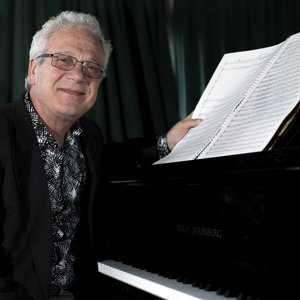Musicweb-InternationalFor all its relative brevity, con-ri-sonanza is a deeply moving piece of music… Simaku’s music is a hard nut to crack but, for my money, well worth cracking. Now I long to hear some of his ensemble music and his orchestral music (the Concerto for Orchestra won the first prize at the International Competition for Lutosławski’s 100th birthday).
BBC Music MagazineI wasn’t at all familiar with Simaku, but I’ve come to appreciate greatly his ability to create unflinching visceral soundscapes. The pieces featuring string quartet are especially compelling here.
DIAPASONThe expressionism cultivated by Thomas Simaku in his string quartets stems more from an inclination for specific harmonic materials and textures rather than mere expressive hypersensitivity…Our preference is admittedly for the most recent Quatuor no 5 (2015), which leaves even more space for interpretation. Quasi-immaterial (first Spaziale), very incisive bites (beginning of 2nd movement), a lyricism electrified by a crepuscular tension and chromatic swarms follow on from one another without losing momentum.
France MusiqueAstonishing music.
GRAMOPHONEThe Fifth Quartet (2015) focuses on duality: two contrasted movements, the second in two parts (separately tracked) of which the latter effects a synthesis the more telling for its being the realisation of a ‘2+2=5’ conceit…Those who doubted the continued viability of a modernist aesthetic may well be surprised.
Rondo Das Klassik & Jazz Magazine…Lʼimage oubliée dʼaprès Debussy has a magical individuality. And the Piano Quintet con-ri-sonanza (2018) is the epitome of tempestuous rest (lessness) – likewise a piece to through yourself into wholeheartedly.
bachtrack, Review of the performance at 2019 ISCM FestivalThe most memorable moment of the evening, however, came at the climax of Thomas Simaku’s La Leggiadra Luna (The Beautiful Moon), in which a thundering eight-note chord reverberated around the St Nicholas’ rafters for what felt like an eternity.
Fanfare Magazine, USA, 2008...the elegance of Ligeti and the gritty intensity of Kurtág, a fascinating combination.
Frank Kämfer, Avangarde und Ethnologie vereint, Deutschlandfunk, Cologne, 2008Simaku's idiom combines avant-gardism and modality in a manner all its own.
Frank Kämpfer, Deutschlandfunk, Cologne, 2008, translated by Mark Hutchinson (read the full review) on Due Sotto Voce per Violino SoloIt is barely conceivable that two voices, accompanying and contrasting one another, and each laden with different associations, are both played by one and the same bow.
Hubert Culot, MusicWeb International, 2008 on Naxos CD Works for StringsThe works recorded here confirm my early impressions when I first heard some of Simaku's music. Here is a composer who obviously has things to say and who knows how to say them best.
ISCM - World New Music Magazine, July 2006 on Hyllus for Orchestra...an imaginative and captivating piece.
Keith Potter, Tempo, Cambridge, April 2005 on Hyllus for Orchestra...a piece of controlled, dramatic and surprisingly individual power.
Peter Graham Woolf - Seen & Heard, London - review of the ISCM Festival, Luxembourg 2000 on Soliloquy IA piece of unaccompanied violin writing which brings out the instrument's genius for passionate expression, fully realised in the young Luxembourg violinist Vania Lecuit's riveting interpretation.
Politiken, Copenhagen, 2005...tumultuous and glistening, with a deeply convincing inner strength, structural integrity and an impressively thunderous character.
Stuttgarter Nachrichten, 2006...Rèflexions de la Croix III was the only work in the concert which demonstrated a real individual charisma.
Sun-Sentinel, Florida"...Soliloquy III for solo viola [...] explores a wide range of high harmonics and microtonal effects, rapidly switching from violent chordal attacks to spare bowed fragments, reminiscent of Georgy Kurtag in its spare atomistic compression.
The Guardian, 2005 on Radius for 11 solo strings...the work's periodic climactic outbursts achieved striking effect.
Yorkshire Evening Press, 1999 on The Eagle on the CrossThe technical command, dramatic pacing and vivid orchestration made for a seriously impressive musical essay with a real sense of purpose and outrage.
Tempo, Volume 63 - Cambridge University Press 2009Power is certainly the mot juste here, as even in the moments that veer towards silence there is an awareness of the explosive potentialities of the musical surface. As on all the works presented here, the sure voice of the composer is never in doubt.
Fanfare Magazine, USA, November 2000There’s little doubt that Thomas Simaku is a contemporary master. One hopes that his music will get ever wider – for our sake, as well as his.
British Composer Award judging panelThe winning work redefines the instruments in a visionary and entirely original way
Neue Zeitschrift für MusikThe Albanian-British composer Thomas Simaku is not very well known here in Germany, which is unfortunate, since his music is breathtakingly original, as his most recent CD illustrates.

